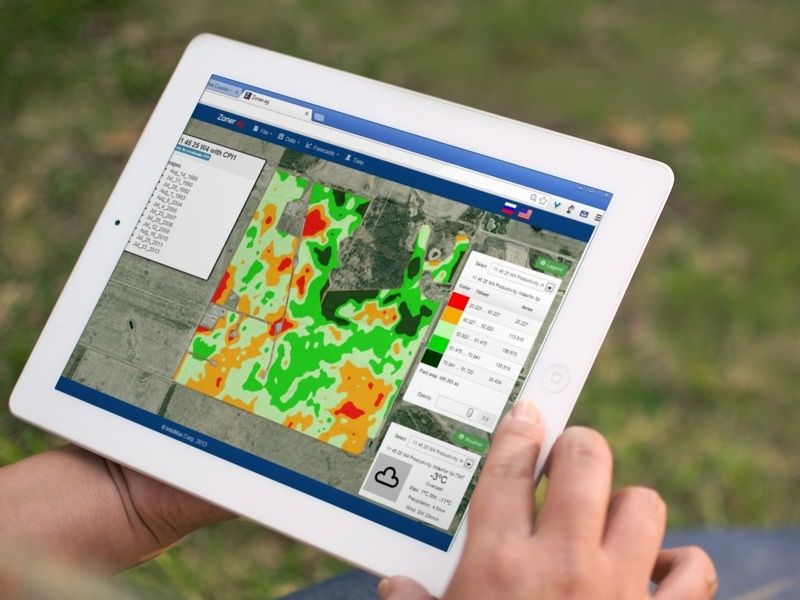Last week, German agrochemicals company Bayer acquired proPlant, a health diagnosis and infection level warning software company to join its growing Digital Farming department.
Bayer Digital Farming, which launched two years ago, is developing new digital products for farmers and has undertaken various pilot projects over the past three years. As part of this build out, it also acquired Canadian satellite imagery analysis company Zoner last year, and with the recent appointment of Andree-Georg Girg as head of commercialization for digital farming, also announced last week, it looks as if the company is ready to bring more products to the market in the near future.
“We have not communicated externally about the Digital Farming strategy and are currently learning and testing the approach to this new segment,” a spokesperson told AgFunderNews.
Ahead of the World Agri-Tech Investment Summit in San Francisco next week, AgFunderNews caught up with Bayer CropScience’s president and CEO James Blome to talk about further M&A potential and researching the microbiome.
Where would you look for other acquisitions in the digital arena?

We look at anything that makes sense in furthering our digital strategy and we haven’t talked publicly about anything specific, but we are interested in any tech that builds upon genetics, weather and farm management practices. The foundation of our belief in data analysis is if we can understand correlations in nutrients, water, soil types, and so on, you can do a lot to manage plant health and other variables in real-time, and correct growth problems in season. There’s also potential to help farmers drive yield curves and calculate their return on investment. We see the ability to do remote sensing from space, which is an incredible innovation. We’re excited by the potential to get several different views from the field, just hours apart, and use those images to understand what’s needed in terms of nutrients and in the use of water management.
What other subsectors of agtech particularly excite you?
There is a lot of exciting science going on in understanding the plant microbiome, which is the new frontier for soil & crop technology. It is very exciting to see how the many millions of microbes, and the different ratios of them, create a healthy root system and an opportunity to increase yield.
What are the main challenges you see for agtech startups at the moment?
Focus. There are so many romantic ways to increase yield, but the grower wants to target profitable yield increases and the investor wants to see sustainable revenue growth. The agtech startup needs to focus and deliver both, quickly.
How has the integration of AgraQuest been since Bayer acquired it in 2012?
We’ve put all the great scientists in a new facility in West Sacramento, which is now our global headquarters for our Biologics Group. We are expanding our approach from screening individual organisms for high levels of biological activity to exploring the microbiome and understanding the communities and ratios of organisms in the growth zone. We are refining our strategic approach to investing in and capitalizing on this new frontier.
How will you commercialize this research?
We will continue to market highly biologically active organisms in formulations for foliar and/or seed treatment applications. Of course highly active proteins that can be expressed in seed traits will be marketed through our seed germ plasm or partner germ plasm sales. Any new products emerging from our multiple organism (communities) research will be marketed as soil amendments or fertilizer partners, as an additive to traditional chemical or biologic inputs or as a seed treatment depending on the need or the normal application sequence for the crop.
Are you looking to acquire more companies in this area?
We are always open to it. There is so much innovation and so many startups, and the fact that we have a base facility, with Bayer scientists, mean we can easily evaluate outside innovations and decide whether or not to acquire or partner with them.
Do you think biologicals will always be an additive to chemical inputs, or could they become stand alone crop enhancement or protection solutions?
Right now, the easiest place to use biologicals is at the end of the food crop production growing season, where vegetables or other food crops are about to go into the market and you want to easily manage pre-harvest residue levels and re-entry periods in the last 15 days of production, specifically on multi-pick crop harvests. And we’re happy with what we have, but I am an optimist and think that biologicals could provide a complete solution later as a result of all of this great research.
Virtually all of your seeds are genetically modified. Do you think the developments around new forms of gene editing and identification such as CRISPR will change this?
Yes, virtually all of our broad acre seed business is genetically modified, but all of our vegetable seed business is conventional breeding. CRISPR is another new frontier alongside microbiome research. And it’s all about how it’s regulated or labeled in the system. GM generally means adding a protein into a seed, whereas CRISPR can make precise mutations by substituting existing DNA sequences with desired ones. It can disable whole genes by snipping them out or via imprecise repairs that knock out gene function. CRISPR can also be used to introduce new genetic material which makes it a very promising frontier. So this is definitely of interest to us.
Are there any subsectors of agtech you think are overheated or moving in the wrong direction?
Interest around the whole of agtech is increasing rapidly, and we can be learning in all areas: some provide cheaper lessons than other, but there’s something to be learned from all this explosion in startups.
What are you hoping to get out of the World Agri-Tech Investment Summit next week?
We are always on the lookout for interesting ideas and we have several employees attending in addition to Bayer’s sponsoring to ensure we stay on top of the tech and see new ideas early. It’s an extremely competitive market with lots of strategics and funds chasing new tech instead of waiting around for ideas to become trends. We need to be knowledgeable about ideas before they become trends, so the event is a very useful vehicle for us to do our work.
Have news or tips? Email [email protected]





